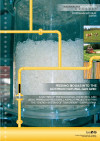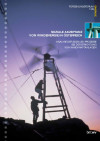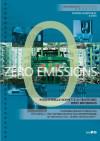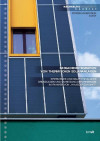Suchergebnisse
24. März 2014: Science Brunch "Photovoltaik und Solarthermie"
ForscherInnen aus Industrie und Wissenschaft präsentieren ihre Sonnenenergie-Projekte. Der Workshop bietet Einblick in die energetische Bilanzierung, sowie Möglichkeiten zur Effizienzsteigerung mit dem Einsatz von Solarthermie.
Ausschreibung des Schirmmanagements "Energiesysteme der Zukunft"
Zur Zeit wird ein geeignetes Schirmmanagement für die Programmlinie "Energiesysteme der Zukunft" gesucht. Bewerbungen können bis 14. Oktober 2002 an den FFF gerichtet werden.
Ausgabe 3/2016 der Publikationsreihe "energy innovation austria"
Die aktuelle Ausgabe beschäftigt sich mit dem Thema Wärmepumpen im Energiesystem der Zukunft.
Konferenz: Umweltmanagement und Innovation (28. - 29. April 2006)
Internationalen Konferenz im Rahmen der österreichischen EU-Präsidentschaft
Dialog in Fokusgruppen: Workshop „Rolle von Speichern, Aggregatoren und Flexmarkt im 100% erneuerbaren Energiesystem“
21. Oktober 2021, 09:30 – 13:00 Uhr
Online
Expert:innen aus aktuellen F&E-Projekten und Vertreter:innen aus der Praxis diskutieren über die Entwicklung des Akteurs Speicher, die Rolle von Aggregatoren als Marktakteure im Stromsystem und das Marktdesign für Flexibilitäten.
Blickpunkt Forschung: Kreislaufwirtschaft in der Stadt @ TU Wien
6. Oktober 2021, 13:30-17:00 Uhr
TUtheSky, Getreidemarkt 9, 1060 Wien sowie online per Livestream
Präsentiert werden Ergebnisse aus Forschungsprojekten, die dazu beitragen, die gesamte Wertschöpfungskette auf allen Ebenen abzubilden – vom Produktdesign, die Wiederverwendung und das Recycling bis zur Verwertung, vom Geschäftsmodell bis zum Konsument_innenverhalten, vom Bauteil zum Stadtteil.
5. GRÜNSTATTGRAU Netzwerkpartnertag
3. Mai 2022
MA39 - Rinnböckstraße 15, 1110 Wien
Der 5. GRÜNSTATTGRAU Netzwerkpartnertag lädt Partner des Innovationslabors zur Vorstellung ihrer Forschungs- und Entwicklungsprojekte sowie Umsetzungsprojekte in Bezug auf grün-blaue Infrastruktur und naturbasierten Lösungen ein. Die Vernetzung mit anderen Partner bietet die Möglichkeit, neue Impulse für Wirtschaft und Forschung zu generieren.
aspern Die Seestadt Wiens - Subprojekt 3a: Technologiezentrum aspern IQ
Anhand des Demonstrationsgebäudes Technologiezentrum aspern IQ wurde gezeigt, dass der Energiebedarf für die Raumkonditionierung (Heizung, Kühlung, Lüftung, Beleuchtung, Warmwasser) aus Energieeigenproduktion über die Jahresbilanz gedeckt werden kann.
Thermische Bauteilaktivierung - Entwicklung eines Rechenkerns (TBA-CALC)
Mit dem Projektergebnis steht in Österreich eine einheitliche Softwareumgebung zur Simulation der thermischen Bauteilaktivierung in Form eines validierten Tools zur Verfügung.
Modular and standardised passive houses in solid timber construction
Concerning to an accurate and adaptable construction of 2 to 4 storey solid timber houses with the characteristics of a passive house, a digital construction and dimension system will be developed. The system which contains standardised modular ecological detailed solutions enables an exact dimensioning and installation of passive houses by small carpentering companies.
BIGMODERN - Subprojekt 4: Planungsbegleitende Lebenszykluskostenanalyse
Schaffung technischer und organisatorischer Voraussetzungen für Bauherrn, um planungsbegleitende Lebenszykluskostenanalysen in den Standard Planungsprozess zu integrieren sowie konkrete Anwendung in den beiden Demonstrationsprojekten des Leitprojekts BIGMODERN (SP2 und SP3). Durch Veröffentlichung der wesentlichen Projektergebnisse werden konzeptive Grundlagen und LZKA-Berechnungsergebnisse für alle Stakeholder der Immobilienwirtschaft verfügbar gemacht.
smartEXT - Erweiterung der Einsatzgrenzen bewährter Passivhaustechnik
Sondierung der Einsatzmöglichkeiten von Kompaktgeräten (Komfortlüftung mit Kleinstwärmepumpe, entwickelt für Passivhäuser) in Niedrigenergiehäusern. Kompaktgeräte zur Wärmerückgewinnung, Heizung und Warmwasserbereitung decken die Grundlast, Spitzenlasten werden durch eine neuartig konzipierte Zusatzheizung mit verknüpfter intelligenter Regelung abgefangen. Damit wird eine Steigerung der energetischen Effizienz, somit verbesserte Wirtschaftlichkeit, sowie höherer Wohnkomfort bei gleichzeitiger Entlastung der Umwelt erzielt.
Feeding Biogas Into The Austrian Natural Gas Grid

Analyses of technological, economic, and legal prerequisites as well as pilot projects within the "energy systems of tomorrow” subprogram
Forschungsforum
2/2006
Herausgeber: BMVIT
Englisch, 6 Seiten
Downloads zur Publikation
Single Family Homes and Densified Low-rise Housing - an Analysis of Motives

The study concentrates on describing the reasons behind the slow uptake of space-saving, densified forms of housing, and explains the dominant preference for detached single-family homes. However, it goes beyond simply describing the decisive motives for choices of housing. The study analyses the determining factors and the basic conditions under which these motives come or came into being. Based on this analysis, alternatives will be proposed and evaluated with regard to their effectiveness and feasibility.
built in 2020 - Pictures and stories of tomorrow for building in the future

Production of a comprehensive picture of tomorrow's building using research into future trends, the societal framework and political developments in the building sector.
Benutzerfreundliche Heizungssysteme für Niedrigenergie- und Passivhäuser

Bewertung unterschiedlicher Heizungs- und Lüftungssysteme für Passiv- und Niedrigenergie Mehrfamilienhäuser und Bürogebäude unter Berücksichtigung von Raumklima, mögliche Bandbreite des Benutzerverhaltens, Endenergie- und Primärenergiebedarf, Kosten, Platzbedarf und Fehlerfreundlichkeit bei Installation und Betrieb.
Soziale Akzeptanz Von Windenergie In Österreich

Analyse der sozialen Prozesse bei der Errichtung von Windkraftanlagen
Forschungsforum
1/1999
Herausgeber: BMVIT
Deutsch, 6 Seiten
Downloads zur Publikation
Industrielle Schritte In Richtung Zero Emissions

Österreichische Forschung für abfall- und emissionsarme Industrieprozesse im Rahmen von "Fabrik der Zukunft"
Forschungsforum
3/2004
Herausgeber: BMVIT
Deutsch, 6 Seiten
Downloads zur Publikation
Fassadenintegration von thermischen Sonnenkollektoren ohne Hinterlüftung

Klärung der Anforderungen von Architekten, Dimensionierungsrichtlinien von Fassadenkollektoranlagen, Speichermanagement. Errichtung von Testanlagen.
Mehrsprachig
Fassadenintegration Von Thermischen Solaranlagen

Systemische und bauphysikalische Grundlagen und Umsetzung der Ergebnisse im Rahmen von "Haus der Zukunft"
Forschungsforum
3/2001
Herausgeber: BMVIT
Deutsch, 6 Seiten
